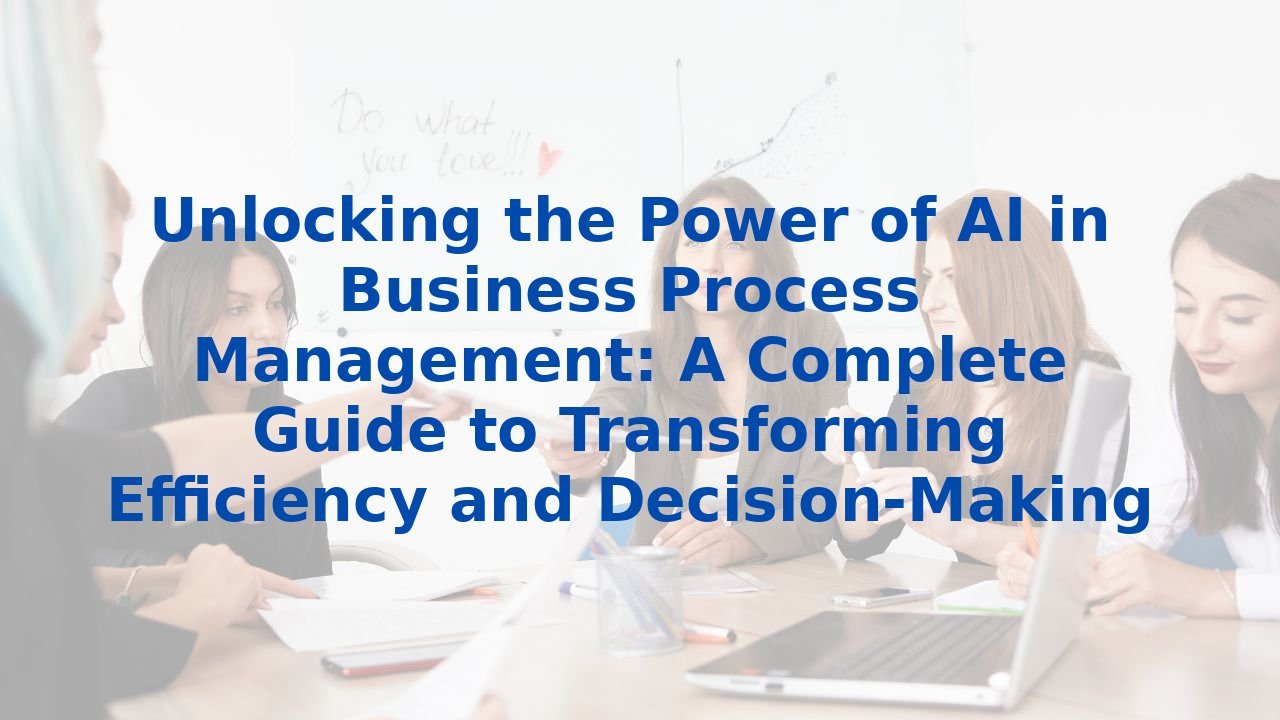Unlocking the Power of AI in Business Process Management: A Complete Guide to Transforming Efficiency and Decision-Making
Unlocking the Power of AI in Business Process Management
In an era where efficiency equates to competitiveness, understanding the interplay of artificial intelligence (AI) and business process management (BPM) holds immense potential. This guidance aims to illuminate how AI not only enhances BPM but also transforms organizational culture and decision-making capabilities
The Transformative Role of AI in BPM
Business process management is integral to organizations striving for enhanced efficiency, streamlined operations, and informed decision-making. Enter AI, a technological marvel that has redefined BPM by promising relentless efficiency, robust data analysis, and invaluable decision-making support. Integrating AI elevates BPM from conventional to extraordinary.
Understanding AI in Business Process Management
At its core, AI in BPM is about harnessing intelligent capabilities to build, analyze, automate, and optimize workflows. This paradigm shift allows users to define their processes and desired data, while AI handles the intricate details, learning, and refining as it progresses. Think of it as an intelligent partner working alongside business leaders to streamline operations.
The Multifaceted Role of AI in BPM
AI’s value within BPM encompasses three main functions:
Data Analysis: AI excels in combing through vast quantities of data, unveiling trends, predicting outcomes, and identifying root causes. This advanced analytical prowess transforms how leaders make tactical and strategic decisions.
Process Building: With AI, the creation of new processes and workflows can happen seamlessly and efficiently. By leveraging historical data, AI produces optimized processes that align perfectly with user-defined requirements.
Automation: One of AI’s standout capabilities lies in its ability to automate repetitive tasks. Activities that once consumed valuable human resources, such as data entry and customer service inquiries, can now be managed by AI, freeing up teams to focus on value-added tasks.
The Tangible Benefits of AI in BPM
Integrating AI in BPM presents an array of benefits that can catapult an organization's efficiency and productivity to new heights:
- Improved Efficiency: Speed is of the essence, and AI rapidly processes significant data volumes. This elevated speed fosters quicker, better decision-making.
- Enhanced Decision-Making: AI supports decision-making by extracting valuable insights from structured and unstructured data, allowing businesses to navigate complex choices effectively.
- Process Optimization: With AI's analytical capabilities, organizations can simulate processes to evaluate performance indicators, identifying bottlenecks and planning for impactful changes.
- Real-Time Monitoring: AI continuously monitors business processes, enabling proactive problem-solving and ensuring processes stay on track.
AI Applications Across Business Processes
The versatility of AI manifests across the spectrum of business processes:
- Core Processes: From production to customer support, AI can optimize everything, driving productivity and enhancing customer experiences.
- Support Processes: Functions like IT service desk operations and recruitment can benefit from AI's automation capabilities, leading to streamlined management.
- Longtail Processes: AI enhances less frequent processes, like contract reviews or vendor management, by defining patterns for improved workflow efficiency.
The Importance of Training Employees for AI Adoption
While the technology itself is powerful, the effectiveness of AI in BPM is contingent upon one critical factor: your team. Training employees to leverage AI tools effectively is paramount:
- Understanding AI Tools: Knowledge of how AI works fosters seamless integration within existing workflows. Training employees on algorithms and AI technologies is essential.
- Adapting to Change: A willingness to adapt and learn new skills ensures that your organization can embrace the ongoing evolution of AI capabilities.
- Enhancing Collaboration: With the right training, departments can collaborate more proficiently, utilizing AI to optimize processes and deliver cohesive experiences.
To delve deeper into how organizations can effectively prepare their workforce for the AI shift, explore Complete AI Training, a dedicated resource for fostering AI skills across your organization.
Conclusion
The potential of AI in business process management is profound. By embracing AI for data analysis, process building, and automation, organizations can enhance efficiency and empower their teams. However, to realize the full spectrum of benefits, investing in employee training is vital to create a culture that welcomes AI with open arms. This is not just about adopting new tools but evolving into a future-ready organization that thrives in the AI era.
Explore further resources and courses to equip your workforce with essential AI skills at Complete AI Training, guiding your organization through its AI journey.



